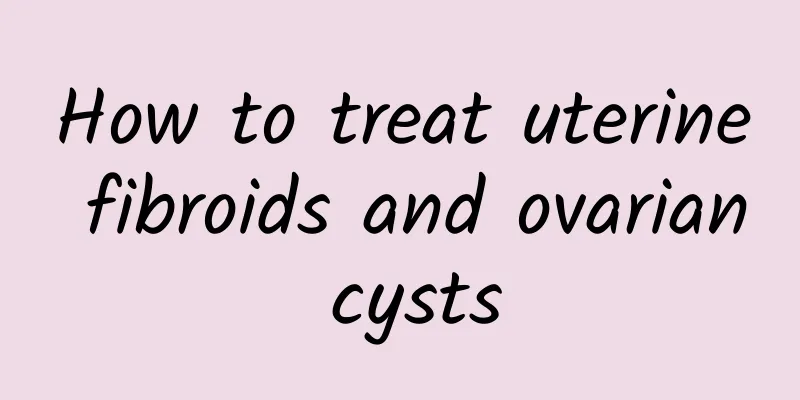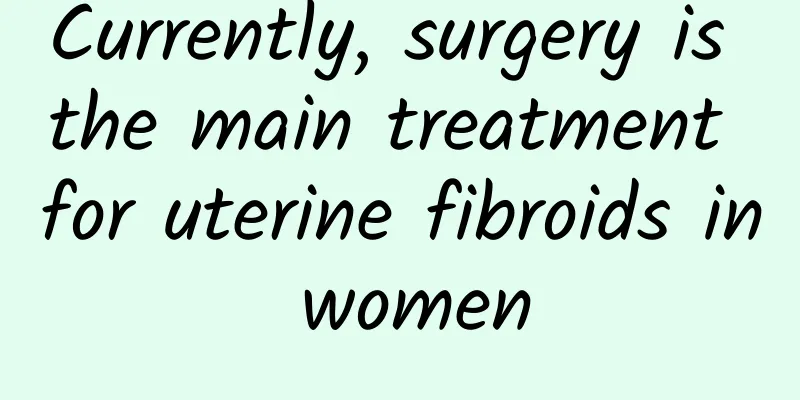How to treat uterine fibroids and ovarian cysts

|
The treatment of uterine fibroids and ovarian cysts requires choosing the appropriate plan according to the specific situation. The following are some common treatment methods: 1. Regular check-ups: For patients with smaller uterine fibroids and ovarian cysts, milder conditions, and less obvious symptoms, especially older women, regular check-ups can be chosen. This method is suitable for those who are in good physical condition and have no obvious discomfort. Regular check-ups can help doctors monitor changes in the condition and ensure that timely measures are taken. 2. Antibiotic treatment: If the ovarian cyst is an inflammatory lesion caused by bacterial infection, antibiotics can be used for treatment. Commonly used antibiotics include piperacillin, moxifloxacin and metronidazole. Antibiotic treatment can effectively control infection and relieve symptoms. 3. Drug treatment: For larger uterine fibroids, especially for young patients who have not yet given birth, drug treatment can be considered. For example, Guizhi Fuling Wan is a traditional Chinese medicine that is often used to treat uterine fibroids. This type of drug can help shrink fibroids, relieve symptoms, and provide better conditions for future fertility plans. 4. Minimally invasive surgery: If the ovarian cyst is large and the patient has not given birth, laparoscopic minimally invasive surgery can be chosen. This surgical method has little trauma and quick recovery. It can effectively remove the cyst and preserve ovarian function. For patients who have given birth and have critical conditions such as ovarian cyst pedicle torsion or ovarian rupture, adnexectomy can be considered. 5. Hysterectomy: For patients with more severe uterine fibroids, especially those who are older, hysterectomy can be an option. This surgical method can completely solve the problem of uterine fibroids, but it needs to be considered carefully because it will affect fertility. The treatment of uterine fibroids and ovarian cysts needs to be selected according to the specific situation of the patient. It is recommended that female friends have regular gynecological examinations to detect problems early and take timely measures. Maintaining a healthy lifestyle, paying attention to diet and exercise can also help prevent and manage these diseases. I hope everyone can have a healthy body and a happy life! |
<<: Symptoms of Trichomonas vaginitis
>>: How long does it take to get rid of the abortion pill?
Recommend
Does vaginal discharge from candidal vaginitis contain blood?
Candidal vaginitis usually does not cause blood i...
How to treat uterine fibroids? What are the treatments for uterine fibroids?
How to treat uterine fibroids? I believe many peo...
You must know the six reasons why leucorrhea is yellow!
Female secretions, also known as leucorrhea, are ...
What is the minimally invasive surgery process for uterine fibroids? How to care after minimally invasive surgery for uterine fibroids?
Due to years of clinical treatment, there are man...
How to deal with pregnancy with intramural uterine fibroids
How to deal with pregnancy with intramural uterin...
Is taking ibuprofen useful for dysmenorrhea? Not always
Taking ibuprofen is not effective for all cases o...
What are the symptoms of hyperplastic vulvar leukoplakia
Now that we have understood vulvar leukoplakia, l...
What are the symptoms of female cervical erosion? These three common clinical manifestations of female cervical erosion
Cervical erosion is a very common gynecological d...
Why does menstruation not come after medical abortion? It may be due to the following two reasons
Medical abortion has been widely used in clinic i...
Why does premature ovarian failure cause headaches?
Why does premature ovarian failure cause headache...
Will I have dysmenorrhea after uterine fibroid surgery? What should I do if I have dysmenorrhea after uterine fibroid surgery?
Women experience pain in the abdomen and waist be...
What is the best food to replenish blood after abortion? Is it effective to eat longan and black beans after abortion?
Women lose a lot of blood during miscarriage. A m...
How harmful is cervical erosion?
Cervical erosion is a common gynecological diseas...
How much does Bartholinitis cost?
Nowadays, more and more female friends are suffer...
What does bimanual diagnosis mean?
Bimanual examination is a common method in female...









